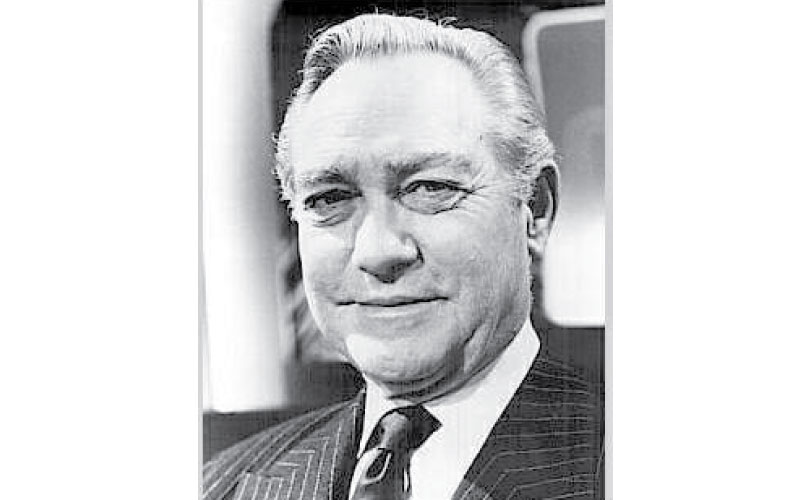
Richard Todd (1919-2009)
FILM star and 1950s square-jawed heart throb Richard Todd is the archetype Englishman – even though he was born in Ireland.
And although he will always be remembered for playing RAF hero Guy Gibson in The Dam Busters, in real life he distinguished himself as a paratrooper.
But few would contradict the American writer who dubbed him the perfect gentleman.
He lived at Little Ponton with his second wife Virginia for more than 30 years before moving to Little Humby for the last few years.
The son of an Army officer, Richard Andrew Palethorpe-Todd spent a few of years of his childhood in India before his family moved Devon.
Life was never handed to him on a plate and only sheer hard work and a dogged determination saw him succeed against overwhelming odds.
He was struck down with rheumatic fever at the age of 12 which led to a heart condition.
Under doctor’s orders, he was unable to ride a bicycle, play sports or go upstairs to bed and was confined to a wheelchair.
Yet although banned from school sports, his family were unaware their 16-year-old son was playing for the local rugby club and winning cups at athletics.
At first he was turned down by the services on health grounds but two days before the outbreak of war he was accepted as a cadet at Sandhurst and weeks later was thrown through a second floor window when a bomb hit his dormitory.
He joined the Army mountain warfare unit in Iceland, then transferred to the 7th Paratroop Regiment, with whom he led the first assault on the Normandy beaches on D-Day.
On that day he served under Major John Howard during Operation Overlord (D-Day) on June 6, 1944, at Pegasus Bridge. Richard parachuted into Normandy and helped hold until relieved.
He went on to star as Major Howard in the 1962 epic war movie The Longest Day, in which he speaks to Lt Sweeny – his own Army nickname.
His acting career had begun in 1938, when he helped establish the Dundee Repertory Theatre before taking a break for the war.
After the war Todd returned to considerably more prominent theatre roles, culminating in the role of Lachie in John Patrick’s The Hasty Heart. He played the same role in the 1949 film which earned him an Oscar and Golden Globe nominations for best actor.
He worked in a clutch of adventure films throughout the next decade, including Alfred Hitchcock’s Stage Fright (1950), The Story of Robin Hood and His Merrie Men (1952), The Sword and the Rose (1953) and Rob Roy, The Highland Rogue (1954).
His most memorable role was that of Wing Commander Guy Gibson in the British box-office smash The Dambusters (1955).
Soon afterwards he appeared in a similar role in the naval drama The Yangtse Incident (1957).
During the 1960s his stiff upper lip stereotype caused him to be cast in numerous military films including Danger Within (1958), The Long and the Short and the Tall (1960), The Longest Day (1962) and Operation Crossbow (1965).
Todd was author Ian Fleming’s first choice to play James Bond, although was overuled by the directors.
He returned to his first love, the theatre, and frequently commuted to the West End or going on tour from his Little Ponton home.
Even a quadruple heart-bypass in the 1990s, which led to septicaemia, only caused him to lose two months work.
And when osteomylitis was diagnosed and his breastbone had to be removed, he took only two days off from his stage duties.
He divorced Virginia in 1992 but they remained in the Little Ponton house for another decade, she making her home upstairs and he downstairs.
Two of his four children committed suicide. In 1997, Seamus Palethorpe-Todd shot himself in the head in the family home, which an inquest was told may have been a depressive reaction to the drug he was taking for severe acne. Then in 2005, Peter killed himself with a shotgun in East Malling, Kent, following marital difficulties
The actor who played the role of hero so many times, in real life upstaged them all.




As a Limo Driver in 2000 i took Richard to several prestigious destinations around the country. Despite his obvious fame Richard insisted that the Privacy partition was to remain down while we drove. Only when making a Personal call would he say “Please excuse my Ignorance” and close the screen. What a Gent.
I interviewed Richard Todd as a 17-years-old journalist for the Skegness News in 1954. I approached him on the set of the DAMBUSTERS film at Gibralter Point and he agreed to the interview, but only if I jumped in his car and spoke to him on his way to Skegness. He talked mainly about his farming, but gave me a few comments about filming. I was too shy to tell him that I had left my bicycle at the film set – and I walked the two miles back to retrieve it! The irony of it was that, although not terribly interested in his farming at the time, I later spent more than 30 years of my career as an agricultural journalist in Lincolnshire and Suffolk. I will be telling this story to the Lindum Scribes writing group at Lincoln on 6th September and will say from first hand experience, what a lovely man he was.- Peter Hopper, Ipswich.
A journalist at the Grantham Journal was reversing out of the car park one day when something slammed on his boot. It was the fist of Richard Todd.
“Trying to create a front page story? ” he shouted.
The driver apologised profusely. “I’m sorry, I just didn’t see you.”
Todd grinned. “I’m sure Alan Ladd has the same problem. I’ll have to borrow his built-up shoes.”